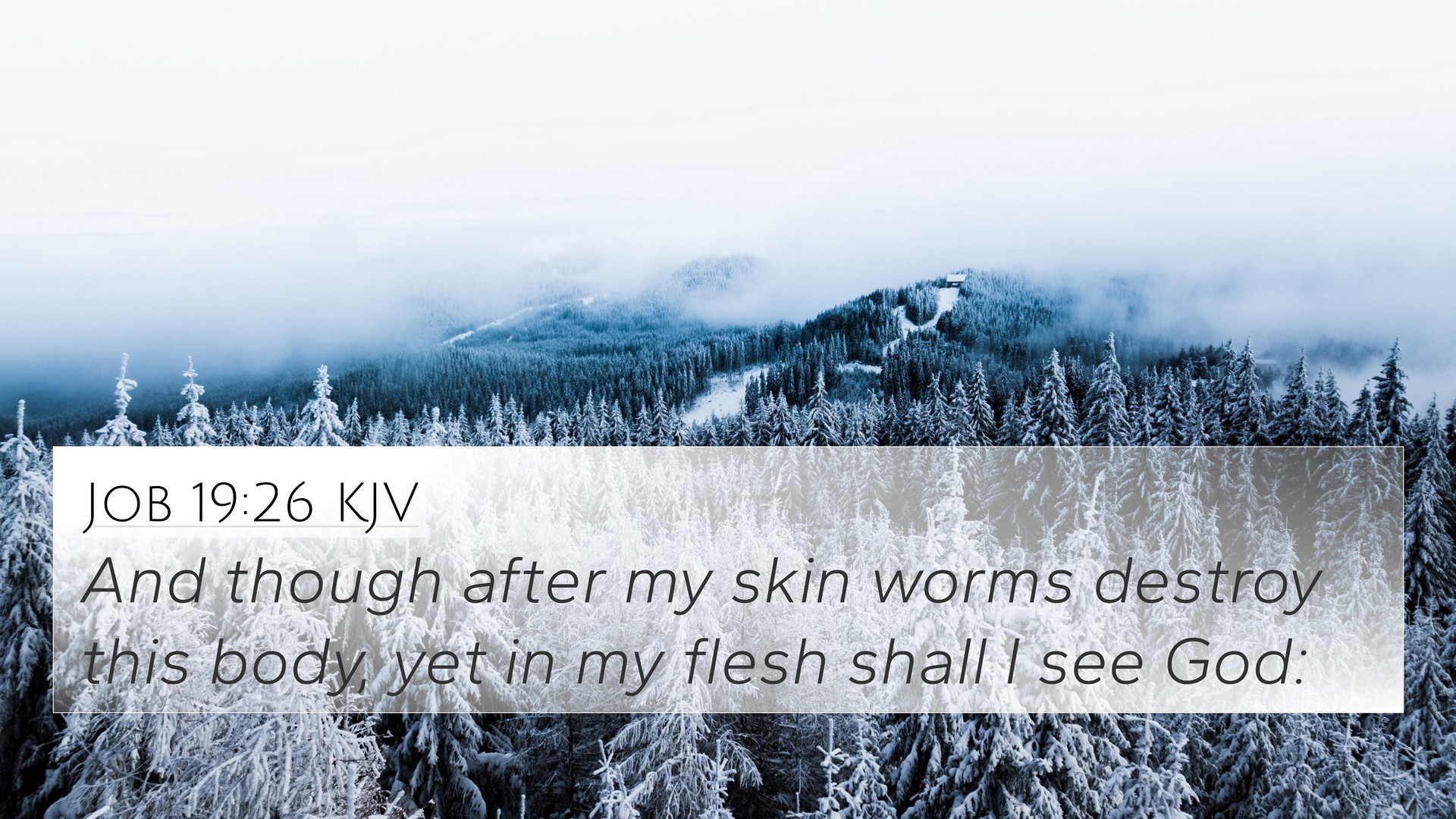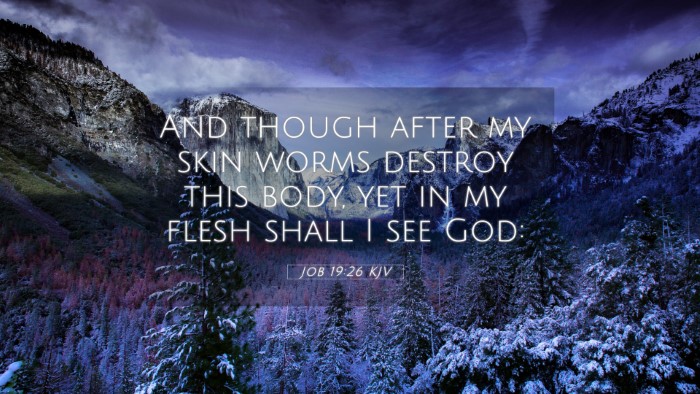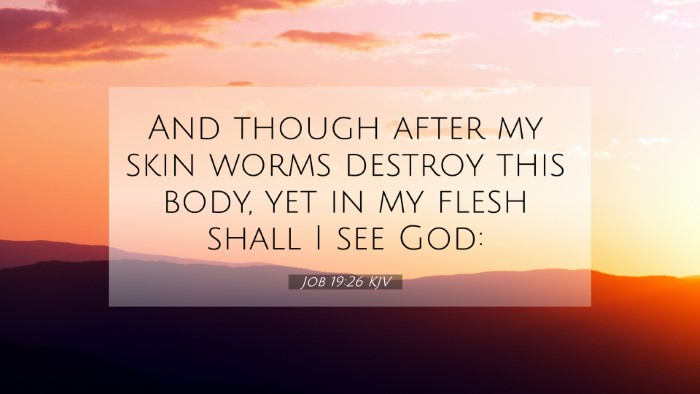Old Testament
Genesis Exodus Leviticus Numbers Deuteronomy Joshua Judges Ruth 1 Samuel 2 Samuel 1 Kings 2 Kings 1 Chronicles 2 Chronicles Ezra Nehemiah Esther Job Psalms Proverbs Ecclesiastes Song of Solomon Isaiah Jeremiah Lamentations Ezekiel Daniel Hosea Joel Amos Obadiah Jonah Micah Nahum Habakkuk Zephaniah Haggai Zechariah MalachiJob 19:26 Similar Verses
Job 19:26 Cross References
And though after my skin worms destroy this body, yet in my flesh shall I see God:
Uncover the Rich Themes and Topics of This Bible Verse
Listed below are the Bible themes associated with Job 19:26. We invite you to explore each theme to gain deeper insights into the Scriptures.
Job 19:26 Cross Reference Verses
This section features a detailed cross-reference designed to enrich your understanding of the Scriptures. Below, you will find carefully selected verses that echo the themes and teachings related to Job 19:26 KJV. Click on any image to explore detailed analyses of related Bible verses and uncover deeper theological insights.

Psalms 17:15 (KJV) »
As for me, I will behold thy face in righteousness: I shall be satisfied, when I awake, with thy likeness.
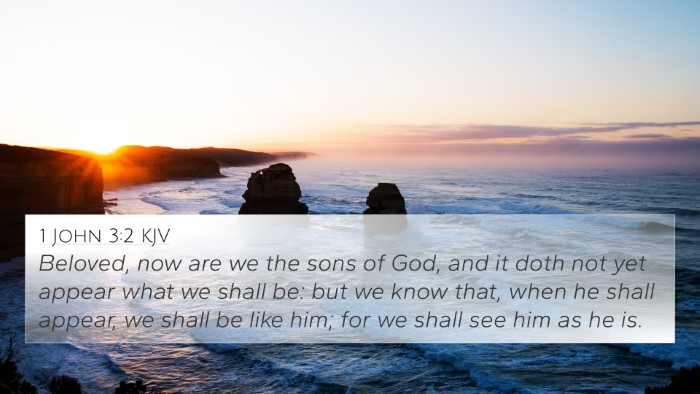
1 John 3:2 (KJV) »
Beloved, now are we the sons of God, and it doth not yet appear what we shall be: but we know that, when he shall appear, we shall be like him; for we shall see him as he is.
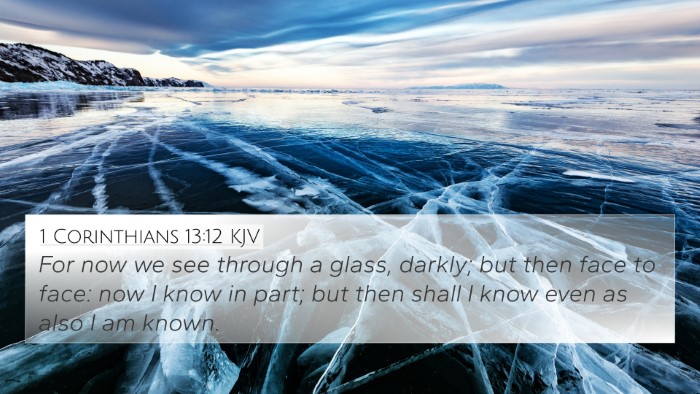
1 Corinthians 13:12 (KJV) »
For now we see through a glass, darkly; but then face to face: now I know in part; but then shall I know even as also I am known.

Revelation 1:7 (KJV) »
Behold, he cometh with clouds; and every eye shall see him, and they also which pierced him: and all kindreds of the earth shall wail because of him. Even so, Amen.

Psalms 16:11 (KJV) »
Thou wilt shew me the path of life: in thy presence is fulness of joy; at thy right hand there are pleasures for evermore.
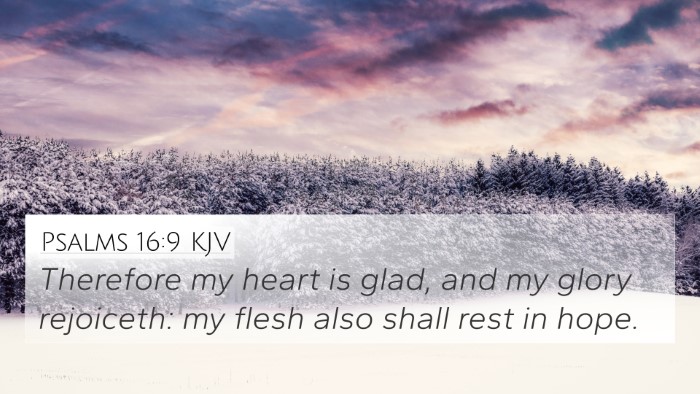
Psalms 16:9 (KJV) »
Therefore my heart is glad, and my glory rejoiceth: my flesh also shall rest in hope.
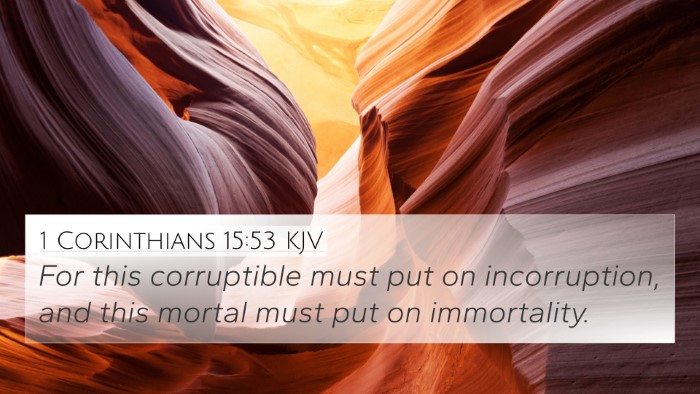
1 Corinthians 15:53 (KJV) »
For this corruptible must put on incorruption, and this mortal must put on immortality.
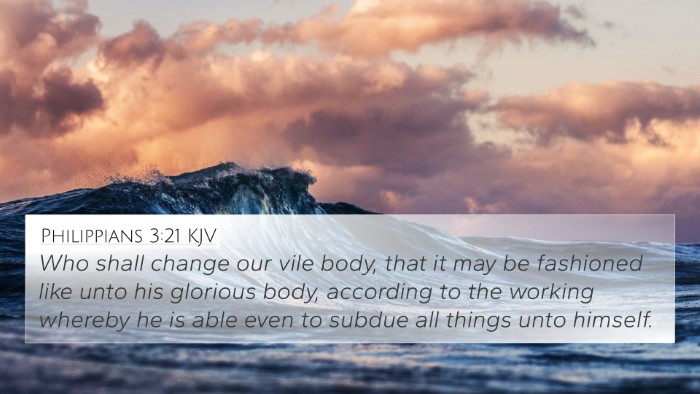
Philippians 3:21 (KJV) »
Who shall change our vile body, that it may be fashioned like unto his glorious body, according to the working whereby he is able even to subdue all things unto himself.
Job 19:26 Verse Analysis and Similar Verses
Understanding Job 19:26
Job 19:26 is a profound verse that encapsulates Job's faith amidst his suffering. The verse states:
"And though after my skin worms destroy this body, yet in my flesh shall I see God."
Commentary Insights
This verse is rich with theological significance and has been explored by various biblical commentators. Below we summarize insights from notable public domain commentators such as Matthew Henry, Albert Barnes, and Adam Clarke.
Matthew Henry's Commentary
Matthew Henry emphasizes Job’s enduring faith in the face of physical decay. He explains that even when Job's body succumbs to death and decay ("worms destroy this body"), there is a confident hope in a future resurrection where he will see God in his renewed body. Henry articulates Job's assurance that despite his current affliction, there is a divine promise of restoration and communion with God.
Albert Barnes' Commentary
Albert Barnes addresses the import of the phrase "yet in my flesh shall I see God." He interprets this as Job’s declaration of hope for a personal encounter with God after death. Barnes highlights that this verse indicates Job's belief in a bodily resurrection, linking it to the broader biblical theme of eternal life. This perspective aligns with New Testament teachings on resurrection as seen in John 5:28-29.
Adam Clarke's Commentary
Adam Clarke discusses the confidence Job expresses in his relationship with God. He points out that the anticipation of seeing God in the flesh signifies a restorative promise from God, going beyond Job’s immediate suffering. Clarke further explains that this verse serves to connect the Old Testament beliefs of resurrection with later New Testament revelations.
Thematic Connections
Job 19:26 resonates with key themes found throughout the Scriptures, facilitating an understanding of resurrection, hope, and divine justice. Here are several relevant biblical connections:
- Job 14:14: "If a man dies, shall he live again?" This underscores the question of resurrection, which Job grapples with throughout his discourse.
- Psalm 16:10: "For You will not leave my soul in Sheol, nor will You allow Your Holy One to see corruption." This verse parallels Job's hope in resurrection.
- Isaiah 26:19: "Your dead shall live; together with my dead body they shall arise." This prophetic verse reaffirms the hope of resurrection.
- Daniel 12:2: "And many of those who sleep in the dust of the earth shall awake." This explicitly states the resurrection belief found in the prophetic literature.
- John 11:25-26: Jesus declares, “I am the resurrection and the life.” This New Testament affirmation connects with Job's hope.
- 1 Corinthians 15:52: "In a moment, in the twinkling of an eye, at the last trumpet." Paul elaborates on the nature of the resurrection which mirrors Joe's hope.
- Revelation 20:12: "And I saw the dead, small and great, standing before God." This speaks to the final judgment and resurrection, similar to Job's aspiration.
Cross-Referencing Biblical Texts
In studying Job 19:26, these cross-references enrich one’s understanding of the text while demonstrating the interconnectedness of Scripture. The thematic approach reveals how foundational beliefs of resurrection and seeing God span both the Old and New Testaments.
This verse is a component of an inter-Biblical dialogue, displaying a consistent theme of hope in God’s plan for humanity beyond physical death. The confidence Job shows is mirrored in the faith of Christians through the New Testament's articulation of eternal life.
Tools for Bible Cross-Referencing
To explore the connections between Bible verses, various tools can assist:
- Bible Concordance: A useful resource for finding terms and their occurrences throughout Scripture.
- Bible Cross-Reference Guide: Helps locate related verses by themes, characters, and events.
- Cross-Reference Bible Study: A method that encourages examination of multiple verses in context to understand deeper meanings.
- Bible Chain References: Provides a sequential study of verses that link together a particular theme or teaching.
Conclusion
Job 19:26 illustrates a profound declaration of hope, reflecting the human longing for divine justice and the promise of life after death. Encouragingly, this hope transcends Job's suffering, resonating with believers and scholars alike across the timeline of Scripture. Through careful cross-referencing, readers can gain deeper insights into biblical themes and enhance their understanding of the interconnected narrative of faith, redemption, and resurrection.
